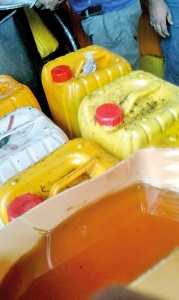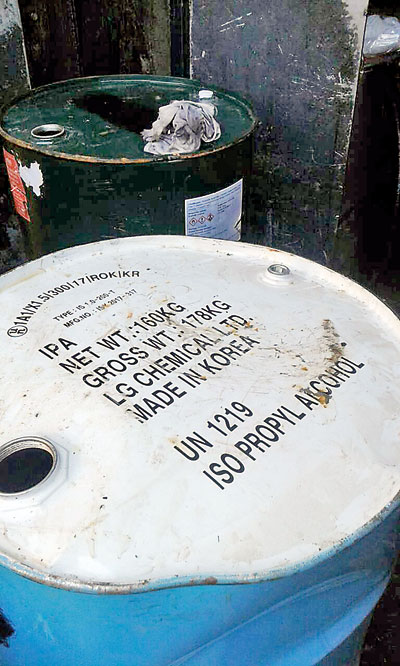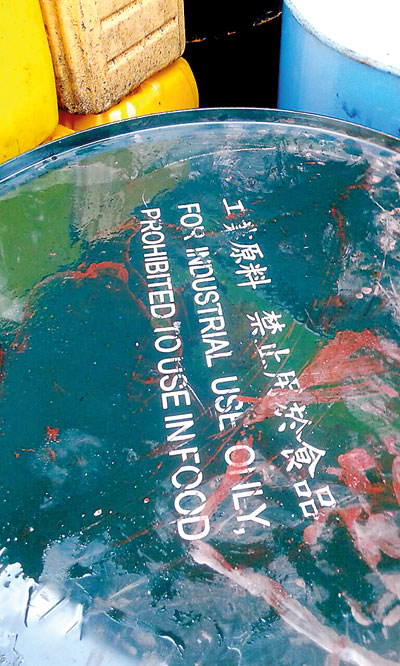News
Coconut oil ‘mafia’ peddling snake oil to regulators and public
Adulterated oil being passed off as coconut oil is widespread in Sri Lanka and it is undermining public health. Consumer officials warn of a ‘’mafia’’ in the trade.

Large containers of used cooking oil, mixed oil products as well as oil which appeared to have been purified by adding chemicals and colouring
Some vendors are re-selling cancer-causing used oil, passing them off as coconut oil. Some are adding sodium hydroxide to turn waste oils into “coconut’’ oil.
But the country’s regulatory system remains weak to tackle the problem at source. Palm oil imports have soared and it has become a multi-billion rupee import industry. And the coconut industry has taken a beating as a result. In February, the Plantation Industries Minister Navin Dissanayake reduced import taxes on edible oil. It was said to be to stabilise prices of coconuts. The special commodity levy on a kilo of coconut and crude palm oil was cut to Rs 20 to Rs 110 and that on a kilo of palm kernel and processed palm oil was also trimmed by Rs 20 to Rs 130.
Raids in the Pettah, considered the hub of cooking oil distribution, have revealed the extent of the adulteration.
The Consumer Affairs Authority and the Coconut Development Authority found in a recent raid that cooking oil was stored in barrels, cans as well as other containers unsuitable for the purpose. Some of them were vessels had been used to store chemicals or tar.
Markings on some containers showed, that they were, “For Industrial use only. Prohibited to be used in food’’. Another container had been used to store ‘Propyl alcohol’, largely used as a solvent in cosmetics and pharmaceuticals and in the preparation of lacquers. They all carried warning signs that the containers were used to transport chemicals.
In the same shop, the officials found it had over 100 cans and many large barrels of used cooking oil, mixed oil products as well as oil which appeared to have been purified by adding chemicals and colouring.
The chairman of the CAA, Hasitha Thilakaratne, said that the cans and the barrels were seized. “The oil was destroyed and the vendor was taken to court. One sample revealed that stocks were adulterated.’’
But in raids by the authority, only 122 oil samples failed inspections between August 2014 and August 2017, despite concerns by consumers about adulteration.
Cases were detected in Colombo, Ampara, Gampaha, Puttalam, Batticaloa, Matara, and Jaffna among others.
Still, Mr Thilakaratne believes that the bulk of the cooking oil is adulterated.
He explained that vendors purchase used oil from well known food outlets, and re-sell them after bleaching, or after mixing with chemicals. He added that they mix palm, sunflower and soy oil and sell it as coconut oil.
“There is a mafia of businessmen, traders, transporters, wholesale vendors as well as retailers who purchase palm oil. Every one at different stages add the cheaper oil such as palm oil to the coconut oil, which is expensive,” he said.
The authority intends to strictly implement a gazette notice issued in October 2016 making it mandatory for manufacturers, importers and traders of all edible oil to package only in bottles, pack, or container.
The gazette notice says the container must have a label showing the batch number, date of manufacture, date of expiry, volume/ weight, maximum retail price, and name and address of the manufacturer. If the product is imported then the label must indicate the import source. If bulk oil is re-packed, then details of the manufactured date, content, and the percentage of blended oil should be mentioned in the label.
“This may cause an increase in the price of oil, but at the same time will safeguard consumers from health hazards,’’ Mr Thilakaratne claimed.
The assistant director (quality control and assurance) of the Coconut Development Authority, Ashoka Pushpakumara, said oil manufacturers and vendors are being informed of the dangers of mixing oils.
He said that coconut oil is widely adulterated because it mixes well with other oils.
Various oils have different boiling points, he said.
“Specially palm oil, which is also widely sold as coconut oil, or mixed with coconut oil, can only be heated once, if used more [than once] trans fat or toxins can enter into the food,’’ he said.
Mr Pushpakumara said trans fats contribute to heart disease, cholesterol and stomach and bowel cancers.
He said the authority helps the consumer products regulator by doing chemical analysis as well as taking samples from markets.
“Used oil is also re-sold as coconut oil by adding sodium hydroxide, it too can burn the internal organs and also cause cancers and other complications to the digestive system.’’
He pointed out that according to their research, 60% to 80% of coconut oil sold in bulk is mixed oil.
The Public Health Inspectors Union deputy secretary Siripala Ketape Arachchi said that according to the Food Act, oil can be blended, but the contents must be named and the blending percentage is 70:30.
He said most restaurants, canteens and mobile eateries use blended oils to fry cutlets, rolls, patties, pastries and wadei.
Existing fines are not a deterrent, he warned.
The Sunday Times learned that even the Consumer Affairs Authority specifies a fine of Rs 1,000 to Rs 10,000 and a six month jail term for food adulteration for small vendors. Fines of between Rs 10,000 and Rs 100,000 are specified for large scale operations.
The acting director general of the Sri Lanka Standards Institute, Ms Nayana N Satharasinghe, said that the vendors use a product called palm olein as palm oil.
She said random checks and chemical analysis are done on imported oils.
Oil imported as pure palm olefin, continues to be mixed in the local markets, she said adding that palm olein is also sold as vegetable oil.

A recent raid rvealed cooking oil stored in barrels, cans as well as other containers unsuitable for the purpose.


